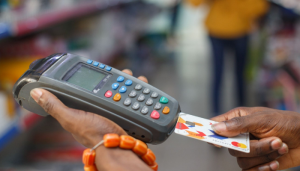The Point of Sale (POS) system has, without question, revolutionized financial transactions across Nigeria—especially in rural and underserved communities. With limited access to formal banking services, POS agents have filled a critical gap, enabling millions of Nigerians to deposit, withdraw, and transfer funds with ease.
However, this innovation is increasingly being misused in ways that threaten our national security, financial integrity, and the justice system. A respected High Court Judge from the Eastern Region of Nigeria recently expressed deep concern to me over the alarming rise in criminal exploitation of POS machines—particularly by kidnappers and fraud syndicates.
According to His Lordship, several cases involving untraceable transactions totaling tens of millions of naira have come before his court. In many of these cases, the inability to trace the flow of funds or verify the identities of POS operators and recipients has severely hindered justice.
Prompted by this judicial outcry, I am compelled to raise the alarm and urge the Central Bank of Nigeria (CBN), policymakers, and security agencies to take urgent regulatory action.

A Tool Turned Weapon
The same POS convenience that has empowered everyday citizens is now being weaponized by criminal elements. In one harrowing case, the family of a kidnapped victim paid over ₦90 million in ransom through POS transactions—yet the money trail completely vanished.
Without regulatory checks, these devices have effectively become anonymous conduits for illicit financial activity, operating outside the reach of law enforcement.
An even more troubling dimension is the ease with which individuals withdraw transferred funds without providing any form of identification.
The judge recounted multiple cases where funds were disbursed by POS agents to persons acting under false identities, with no documentation or verification. In such cases, tracing the origin or destination of the funds becomes nearly impossible—rendering the justice system helpless.
The Regulatory Vacuum
The current legal and regulatory environment is grossly inadequate. Many POS agents are unvetted, lack formal identification, have no fixed business address, and do not adhere to basic Know Your Customer (KYC) protocols. No law presently holds these agents accountable for disbursing funds without verifying the recipient’s identity.

This glaring loophole allows criminal networks to channel vast amounts of money through POS machines—unrecorded, unmonitored, and untraceable.
Urgent Regulatory Actions Required
To safeguard Nigeria’s financial and judicial systems, decisive regulatory reforms are urgently needed:
1. Immediate CBN Intervention
The CBN must issue and enforce clear regulations requiring mandatory registration, licensing, and operational guidelines for all POS agents. These should include:
- Daily transaction limits
- Geo-tagging of POS terminals
- Real-time transaction monitoring
- Periodic compliance audits
2. BVN/NIN Integration
All POS machines and linked accounts must be tied to the agent’s BVN and NIN. This ensures traceability and provides a direct line of accountability for any suspicious activity.
3. Mandatory Identification Before Withdrawals
Regulations should mandate that any individual seeking to withdraw funds via POS must present verifiable identification—such as a NIN, Voter’s Card, Driver’s License, or International Passport. POS agents must:
- Retain a copy (digital or physical) of this ID
- Capture the individual’s photograph
- Present these records upon lawful request by security agencies
4. Accountability for Agents
Any POS operator who disburses funds without proper KYC documentation should face criminal and civil liability for aiding or abetting crime. Additionally, POS agents must not receive funds into their accounts on behalf of customers unless the customer is physically present and complies with KYC rules.
5. Security Integration
Security agencies like the EFCC, DSS, Police, and the Nigerian Financial Intelligence Unit (NFIU) must be given secure access to a centralized POS transaction database. This will help detect abnormal patterns and preempt criminal activity.
6. Geo-Fencing and AI Surveillance
The CBN, in partnership with fintech stakeholders, must deploy artificial intelligence and geo-fencing tools to track suspicious POS usage—particularly in high-crime areas or where unusual transaction volumes occur. High-risk operators should receive special regulatory scrutiny.
7. Public Education and Community Vigilance
There must be nationwide awareness campaigns on safe POS usage. Communities should demand proper identification from POS agents and report any suspicious transactions or behavior.
A Wake-Up Call to Policymakers
The situation is fast becoming unsustainable. The Hon. Judge’s courtroom frustrations reflect a grim reality: justice cannot be served when the trail of financial evidence is erased by anonymity. Where there is no proof, the law is powerless.
This is a clarion call to the CBN, National Assembly, financial institutions, and security agencies: we must close this gaping hole in our financial and security systems. The time for action is now. Let us protect what is good in this innovation by eliminating the loopholes that threaten to destroy it.
Let us restore transparency, accountability, and integrity to one of the most widely used—but dangerously unregulated—financial platforms in Nigeria today.
Read More:
NBA-ICLE Portal: Your First Step to Seamless Access to MCPD Training and CPD Tracking









